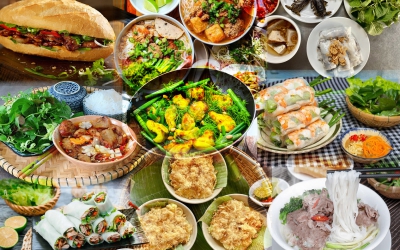While most travelers venture to Sapa for their trekking experience, between the rice fields and villages of Muong Hoa valley, many don’t know that you can also do great trekking in Ha Giang. In fact, it is one of the best destinations for trekking in Vietnam. This province is mainly visited in the form of the Ha Giang loop, by motorbike or private car, but these same mountains offer great hiking opportunities.
1. Trekking in Hoang Su Phi

It is true that most of the trekking in Ha Giang is around the impressive karst mountains and lacks the paddy rice fields – the biggest draw for many to do their trekking in Sapa. But many don’t know that some of the most impressive rice fields in Vietnam are actually to be found in Ha Giang, namely Hoang Su Phi. It is hardly visited by tourist due to it’s off the beaten destination and without any easy transport to the area. Because of this, it always stayed under the radar. This makes visiting Hoang Su Phi unique and authentic. Similar as Sapa, the best way to see it is by making a stunning trekking from village to village while walking on the edge on some of the most superb cultivated areas in the world.
2. Trekking Around Dong Van

If you want to do a trekking in Ha Giang which is more along the route of the loop, Dong Van is your best option. In and around Dong Van Karst Plateau Geopark you will find the most stunning mountains of the province in combination with lots of villages of ethnic minorities. There is a variety of options available and you can choose from half day, full day or a multiple day trekking with overnight stay in a local homestay.
Especially the area between Dong Van town and Lung Cu is very nice. Also Sung La valley, Sa Phin and Phin Tung are beautiful. In between Dong Van town and Meo Vac, you find the famous Ma Pi Leng Pass, which also has an option for trekking.
3. Trekking Around Ha Giang City

Around Ha Giang City you will find some small minority villages which are a great base to start your trekking tour from. Two of the more known are Thon Tha village, just 5 km from the city and Khuoi My villagge. It is surrounded by hills and vast rice fields. The mountains are less high than the area around Dong Van, but instead of that you get a lot more rice fields in return and it is not so exhausting due to the more flat landscape. It is very peaceful to walk through these villages of minority. Most houses are from the Tay people who live in traditional stilt houses made out of wood and bamboo. Below the house often live farm animals such as buffaloes or pigs. Plan your trekking along a stream or to a waterfall to cool down.
4. Trekking Around Quan Ba

Quan Ba is mainly known as a quick stop at the scenic Heaven Gate and the views on the Twin Mountains. But a bit father from the main road you can find many small villages of ethnic minorities along the river. It is very peaceful to make a trekking around here. There are trails that go farther up the mountains where you have great views over the villages, river and valley below.
5. Trekking in and Around Du Gia

If you are doing the loop in 3 days (or even less), you would most likely skip the area around Du Gia or just drive through it. Only the travelers that do the loop in at least 4 or 5 days will stay overnight here, and experience what a peaceful place this is. Compared to the rest of the destinations you visit during the loop, you will find a lot more rice fields here. Other ethnic minorities also live here, often in stilt houses, where other minorities along the loop are often living in houses made of stone, wood or mud. The lifestyle in combination with rice fields are more similar to those in Thon Tha village near Ha Giang city, the big advantage of Du Gia however, is that there are many high mountains here that surround the villages. During a Ha Giang trekking in this area you can also visit waterfalls and cool off in the small streams that flow through this area.
Ha Giang Trekking Tips
Where to book your Ha Giang trekking
Most of our Ha Giang tours here have optional ad-dons to make a trekking for a day in Dong Van. Though we also do trekking of multiple days and in different areas in Ha Giang province. For this, you can just contact us and let us know what you would like to see and do, so we can arrange the perfect trekking experience.
What To Bring
Pack as light as possible to make your trekking comfortable. In the winter it can gets a bit colder, but it is better to wear layers that you can easily add or take off, then to bring warm sweaters. Proper hiking shoes or walking shoes are highly recommended. A tin jacket against the rain and as a windstopper is very useful too. Meals are provided in local homestays and restaurants along the way, but bring snacks if you easily get hungry, because there are not many shops on the way.
Best Time for Trekking in Ha Giang
-
You can do trekking in Ha Giang all year, though in the summer months there is a lot more rain, especially in July and August. This can make trekking less comfortable and there is more chance at landslides.
-
December and January can be a bit colder, although this cool weather could be perfect for a longer trekking. In addition, in January it is flower season and in October to December it is Buckwheat flower season.
-
If you want to see the rice fields in Hoang Su Phi in full glory, you should visit at harvest season from September to begin October.


.jpg)

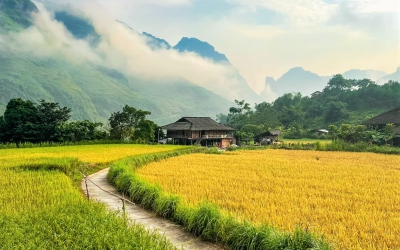
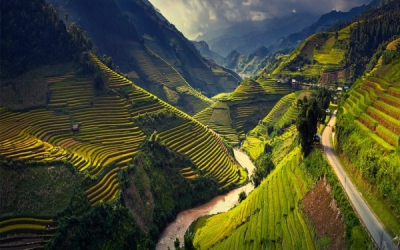
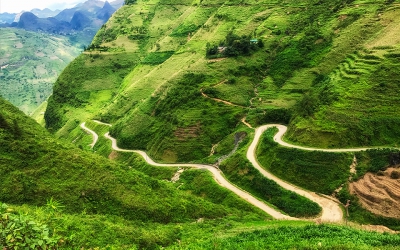
.jpg)
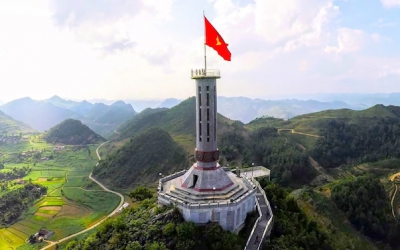
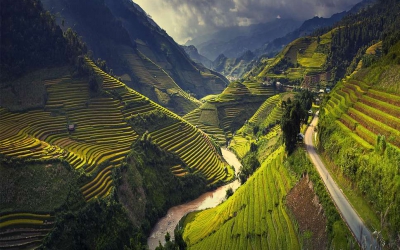
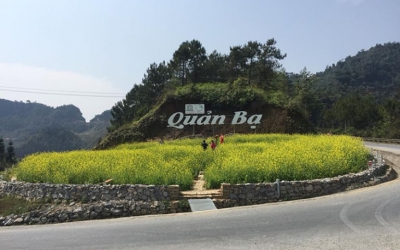
.jpg)
